|
|
|
Sort Order |
|
|
|
Items / Page
|
|
|
|
|
|
|
| Srl | Item |
| 1 |
ID:
020529
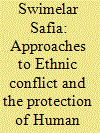

|
|
|
|
|
| Publication |
Autumn 2001.
|
| Description |
98-126
|
|
|
|
|
|
|
|
|
|
|
|
|
|
|
|
| 2 |
ID:
089512


|
|
|
|
|
| Publication |
2009.
|
| Summary/Abstract |
Mediating regional conflict in Asia is a delicate art. It requires an acute understanding of the unique mediation culture in the region. China's mediation in the nuclear crisis on the Korean Peninsula reveals key elements of this art and offers useful lessons. China's experience illustrates that an influential but neutral and harmony-oriented mediator is critical in the Asian context. It is equally essential for the mediator to (1) abide by the principle of noninterference in other countries' internal affairs while maintaining active intervention as dispute escalates, (2) stand ready to nudge those being mediated toward action when necessary to advance peaceful negotiations, (3) establish an optimal environment to foster communication and reduce hostility between the major parties in dispute, (4) serve as an honest broker but remain firm in its own position and cautiously take initiatives to guide the talks, (5) advocate a step-by-step approach to the negotiation process, and (6) aim for the outcome of negotiations to be a give-and-take agreement. Although Asia is a conflict-prone region, Asians traditionally confuse mediation with meddling. As a result, non-Asians often try to serve as mediators for Asia. For more effective mediations, it is essential that Asians rediscover their useful mediation skills and that non-Asians better understand the Asian art of mediation when they act as mediator.
|
|
|
|
|
|
|
|
|
|
|
|
|
|
|
|
| 3 |
ID:
154710
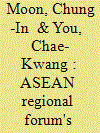

|
|
|
|
|
| Summary/Abstract |
The Association of Southeast Asian Nations Regional Forum has introduced the Experts and Eminent Persons system as a security affairs–related epistemic community in Asia Pacific. However, its performance has remained rather stagnant. This article assesses its performance by examining achievements and limitations of the system and identifies barriers to its effective functioning. The findings attribute its dismal performance to skewed composition and poor quality of membership, lack of depth and diversity of expertise and knowledge, absence of knowledge sharing or diffusion function, and negligible policy impact. The article suggests ways to improve the performance of the ARF-EEPs, and concludes by offering theoretical, empirical, and policy implications.
|
|
|
|
|
|
|
|
|
|
|
|
|
|
|
|
| 4 |
ID:
065032
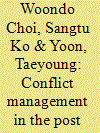

|
|
|
| 5 |
ID:
116427


|
|
|
|
|
| Publication |
2012.
|
| Summary/Abstract |
Abstract The Republic of Fiji experienced three armed coups in less than twenty years - 1987, 2000, and again in 2006 - symptoms of inter-communal tensions in the country and a political, economic and social system unable to manage them. The Commonwealth, through the good offices of its Secretary-General, was the lead international actor in responding to the crisis that followed the 2000 coup. The following study provides an overview of the Commonwealth as an institution, with a focus on its conflict prevention capacity, through the lens of its actions in Fiji at the time. It seeks to identify the nature and impact of Commonwealth engagement, highlighting potentially useful lessons regarding the institution, the individuals who acted on its behalf, and the efficacy of their actions.
|
|
|
|
|
|
|
|
|
|
|
|
|
|
|
|
| 6 |
ID:
047115
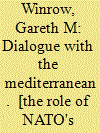

|
|
|
|
|
| Publication |
New York, Garland Publishing, 2000.
|
| Description |
xix, 261p.
|
| Standard Number |
0815336241
|
|
|
|
|
|
|
|
|
|
|
|
Copies: C:1/I:0,R:0,Q:0
Circulation
| Accession# | Call# | Current Location | Status | Policy | Location |
| 044334 | 327.1822/WIN 044334 | Main | On Shelf | General | |
|
|
|
|
| 7 |
ID:
036713
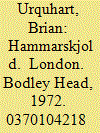

|
|
|
|
|
| Publication |
London, Bodley Head, 1972.
|
| Description |
xv, xxv, 630p.: ill.Hbk
|
| Standard Number |
0370104218
|
|
|
|
|
|
|
|
|
|
|
|
Copies: C:1/I:0,R:0,Q:0
Circulation
| Accession# | Call# | Current Location | Status | Policy | Location |
| 012840 | 923.2/URQ 012840 | Main | On Shelf | General | |
|
|
|
|
| 8 |
ID:
117795
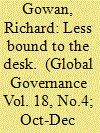

|
|
|
|
|
| Publication |
2012.
|
| Summary/Abstract |
WHAT SORT OF DIPLOMATIC STRATEGIST IS BAN KI-MOON? SINCE BAN TOOK
office as Secretary-General of the United Nationsin 2007, there has been a
great deal of discussion about his personal diplomatic style. Until the Arab
Spring, he was typically characterized as an archetypal (though not always
effective) quiet diplomat. In January 2011, Human Rights Watch accused
Ban of having an "undue faith in his professed ability to convince by private persuasion" when dealing with repressive governments in cases such
as Myanmar, Sudan, and Sri Lanka.
1
As I argued in a previous article for
Global Governance, Ban's belief in diplomacy meant that he took too little
interest in peacekeeping during his first term leading the UN.
2
Since the
beginning of the Arab Spring, however, Ban appears to have lost some of
hisfaith in diplomatic niceties. He spoke out early in favor of the protestors
in Egypt, became a consistent supporter of military action in Libya, and
publicly condemned the Syrian regime's violence against civilians as early
as May 2011.
3
Asthe Syrian crisis deteriorated in 2012, Ban appointed first
his predecessor, Kofi Annan, and later the stalwart UN mediator Lakhdar
Brahimi as envoys to Damascus but repeatedly escalated his own criticism
of President Bashar Al-Assad.
|
|
|
|
|
|
|
|
|
|
|
|
|
|
|
|
| 9 |
ID:
088394
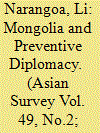

|
|
|
|
|
| Publication |
2009.
|
| Summary/Abstract |
Since 1992, Mongolia has sought to embed itself and its neighbors, Russia and China, in regional security arrangements and international law. This strategy can be categorized as preventive diplomacy and involves seeking to create a climate in which conflict will not arise, rather than managing conflict after it has emerged.
|
|
|
|
|
|
|
|
|
|
|
|
|
|
|
|
| 10 |
ID:
000780
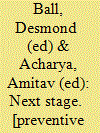

|
|
|
|
|
| Publication |
Canberra, Strategic and Defence Studies Centre, 1999.
|
| Description |
xx, 335p.
|
| Series |
SDSC working paper;131
|
| Standard Number |
0731527550
|
|
|
|
|
|
|
|
|
|
|
|
Copies: C:1/I:0,R:0,Q:0
Circulation
| Accession# | Call# | Current Location | Status | Policy | Location |
| 041978 | 327.17095/BAL 041978 | Main | On Shelf | General | |
|
|
|
|
| 11 |
ID:
169172
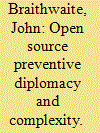

|
|
|
|
|
| Summary/Abstract |
Limits of intelligence services in identifying opportunities for preventive diplomacy are identified. These limits are then used to suggest an open source preventive diplomacy wiki strategy for armed conflict prevention. A complexity theory analysis lays a foundation for arguing that a good theory of preventive diplomacy is less useful than a good meta theory. In a complex world of diplomacy it is wrong to argue that there is nothing as practical as a good theory; but a good meta theory may be a practical path to saving lives. A responsive theory of peacebuilding is proposed that layers and sequences preventive strategies.
|
|
|
|
|
|
|
|
|
|
|
|
|
|
|
|
| 12 |
ID:
019946
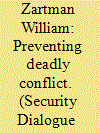

|
|
|
|
|
| Publication |
June 2001.
|
| Description |
137-154
|
|
|
|
|
|
|
|
|
|
|
|
|
|
|
|
| 13 |
ID:
078701
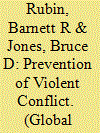

|
|
|
|
|
| Publication |
2007.
|
| Summary/Abstract |
In endorsing the recommendations of the High-level Panel on Threats, Challenges and Change, then UN Secretary-General Kofi Annan committed to strengthening the organization's function to prevent armed conflict. A review of the UN's track record in the three types of conflict prevention-operational, structural, and systemic-shows its success has been limited to cases of interstate conflict between smaller powers. Serious political and institutional obstacles will continue to thwart the UN in preventing wars between powerful states or managing internal conflicts. However, the renewed prevention agenda offers an opportunity to Secretary-General Ban Ki-moon and his team to refocus the UN's efforts to take advantage of the organization's potential as a catalyst and strategic center of political action while keeping a realistic view of its capabilities to implement conflict prevention in different contexts.
|
|
|
|
|
|
|
|
|
|
|
|
|
|
|
|
| 14 |
ID:
013508
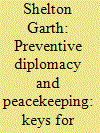

|
|
|
|
|
| Publication |
1997.
|
| Description |
3-14
|
|
|
|
|
|
|
|
|
|
|
|
|
|
|
|
| 15 |
ID:
148955
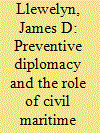

|
|
|
|
|
| Summary/Abstract |
Southeast Asia’s international shipping lanes (ISL) are essential to the economic security of the Asia-Pacific region. Maintaining good order at sea serves to protect regional trade and can be achieved through collaboration between civil maritime security agencies (coast guards). Japan and China both have significant coast guard capabilities and diplomatic influence in the region that could be harnessed to promote civil maritime security cooperation with the countries of the Association of Southeast Asian Nations (ASEAN). With regional tensions rising over disputed waters in Southeast Asia, ‘white hull diplomacy’ would seem to be a timely option for governments to consider in search of an intra-Asian de-escalation process.
|
|
|
|
|
|
|
|
|
|
|
|
|
|
|
|
| 16 |
ID:
116424
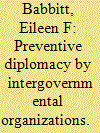

|
|
|
|
|
| Publication |
2012.
|
| Summary/Abstract |
Abstract Conflict prevention is enjoying a renaissance in international policy circles. However, the official machinery of the international community presently offers few institutions with a specific mandate to address the causes of political violence at an early stage. One such multilateral mechanism dedicated solely to the prevention of conflict is the High Commissioner on National Minorities (HCNM) of the Organization for Security and Co-operation in Europe (OSCE). Over two decades, the office has developed a significant track record of effectiveness against which to examine the preventive efforts of other intergovernmental organizations. In this article, we examine the prevention efforts of the HCNM in Georgia, Macedonia, and Ukraine and compare these with the preventive diplomacy of three other intergovernmental organizations (IGOs): the Organization of American States (OAS) in Guyana, the Commonwealth in Fiji, and the UN in Afghanistan, Burundi, and Macedonia. Our findings offer some useful and surprising insights into effective prevention practice, with implications for how IGOs might improve preventive diplomacy in the future.
|
|
|
|
|
|
|
|
|
|
|
|
|
|
|
|
| 17 |
ID:
088146
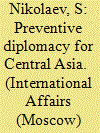

|
|
|
|
|
| Publication |
2009.
|
| Summary/Abstract |
COUNTRIES IN CENTRAL ASIA are exposed to a number of conflict-provoking threats: terrorism and extremism, drug trafficking and organized crime. Turning to the UN for good services in this context looks logical since the UN has many tools to react to such threats and experience in settling the most diverse conflicts.
This led to the establishment in Ashgabat of the new international agency - the UN Regional Center for Preventive Diplomacy for Central Asia (UNRCCA).
As early as November 2004, Turkmenistan proposed the creation of UNRCCA. The initiative was backed by Kazakhstan. Next there followed a series of consultations between representatives of all five Central Asian states who gave this idea their unanimous approval and agreed to headquarter the Center in the capital of Turkmenistan.
On May 7, 2007, UN Secretary General Ban Kimoon informed the chairman of the UN Security Council Zalmay Khalilzad that, in line with the UN Global Counter-Terrorism Strategy and recommendations of the High-Level Panel on Threats, Challenges and Change pertaining to the need to boost the UN potential for the prevention of conflicts, he intended to establish UNRCCA in Ashgabat.
|
|
|
|
|
|
|
|
|
|
|
|
|
|
|
|
| 18 |
ID:
116426
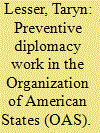

|
|
|
|
|
| Publication |
2012.
|
| Summary/Abstract |
Abstract The South American country of Guyana has a history of turmoil and violence around its presidential elections. The 2006 elections, however, were cited as largely free of violence and post-election unrest. While the peaceful outcome may be attributed to a number of factors, the involvement of the Organization of American States in setting up an electoral observation mission and in engaging in preventive diplomacy played a constructive role in the process, in addition to other ongoing initiatives. This article examines the OAS' use of its mandate for the preservation of democracy as an entry point for conflict prevention. In particular, it analyzes the role of election monitoring and the facilitation of dialogue as a form of preventive diplomacy. The article argues that the Guyana case provides an example of the OAS using its democracy promotion mandate to prevent conflict, specifically election-related violence. It also highlights some of the critiques of OAS work in the area of democracy promotion and election monitoring, noting that the organization has engaged in these activities only in selective cases that meet specific criteria.
|
|
|
|
|
|
|
|
|
|
|
|
|
|
|
|
| 19 |
ID:
103078
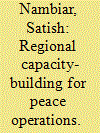

|
|
|
| 20 |
ID:
104126
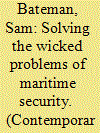

|
|
|
|
|
| Publication |
2011.
|
| Summary/Abstract |
Maritime security is a major concern in the Asia Pacific, yet is riddled with highly complex "wicked problems" that have thus far defied solution. These include different interpretations of the Law of the Sea underpinning regional maritime security, the lack of good order at sea, numerous conflicting claims to maritime jurisdiction, the implications of increased naval activity in the region and the lack of agreed maritime boundaries. This article identifies major wicked problems and reflects on the likelihood that they will be successfully addressed in regional forums. It finds some optimistic indications of a greater preparedness to address these issues than has been the case in the past. However, much will depend on whether existing mindsets can change to allow regional countries to corporate more effectively with regards to maritime security. The article concludes with the proposal that an Asian Peace Research Institute should be established to promote more independent thinking and greater cooperation.
|
|
|
|
|
|
|
|
|
|
|
|
|
|
|
|
|
|
|
|
|